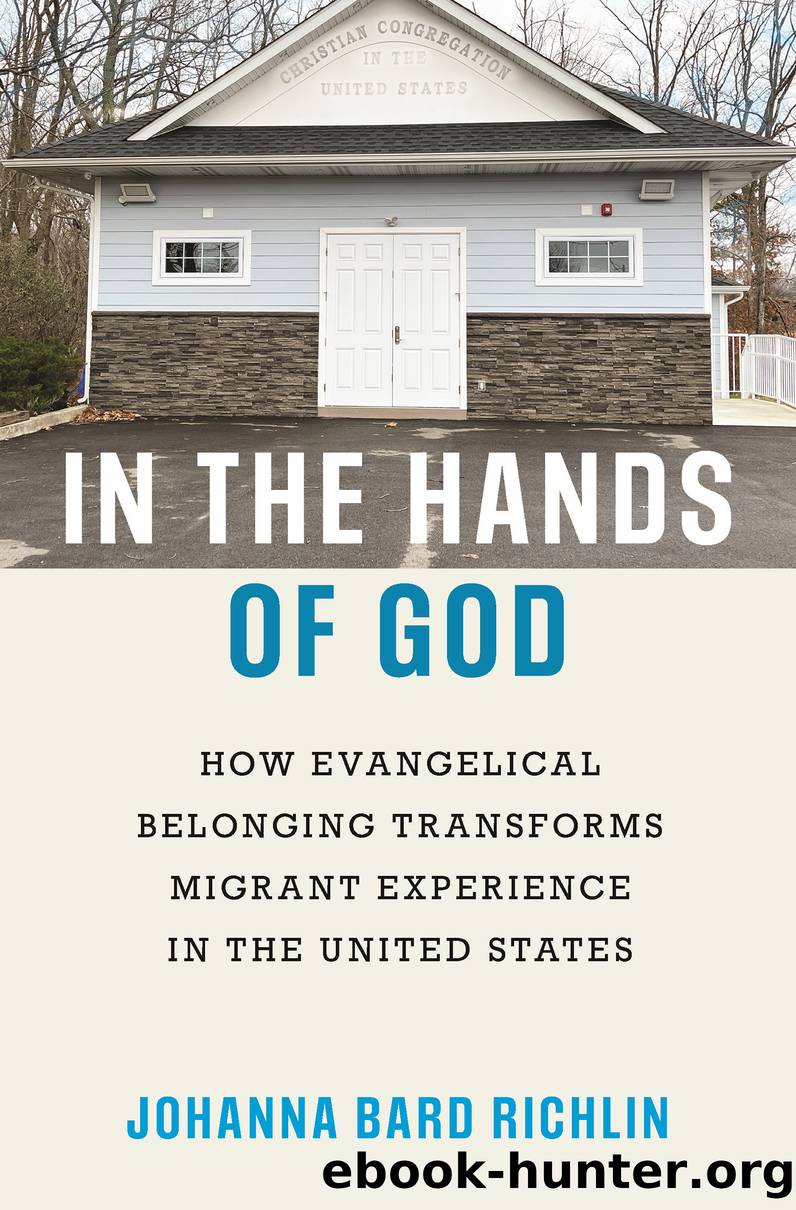In the Hands of God by Johanna Bard Richlin

Author:Johanna Bard Richlin
Language: eng
Format: epub
Publisher: Princeton University Press
Published: 2022-04-12T00:00:00+00:00
Unity in Diversity: The Catholic Churchâs Reductive Approach to Culture
Finding, meeting, and gaining access to Brazilian Catholic groups and their members proved surprisingly difficult. This fact immediately struck me as a significant divergence from Brazilian evangelical congregations, which I easily identified owing to their visibility and prominence in the region. While I visited local evangelical congregations unannounced, I needed to navigate the regional bureaucracy of the Catholic Church to identify Brazilian migrant Catholic communities. I found the Multicultural Ministry of the Diocese of Arlington through web research, which listed a âBrazilian Catholic Communityâ among its many âmulticulturalâ groups. Correspondence with the American director of this entity, Margaret, led to a second Brazilian Catholic group, organized by the Diocese of Washington, DC, in Montgomery County and overseen by the Scalabrini mission, a Catholic order founded specifically to attend to migrants and refugees.
Many of my initial emails and phone calls to the local priests and administrators of these groups went unanswered for weeks. Several times, I considered dropping the comparative piece of my study altogether. When Cláudia, a prominent member of the Brazilian Catholic group in Montgomery County, failed to show up to our meeting after postponing several times already, I was particularly discouraged. I had driven forty-five minutes, attended the Sunday morning Portuguese Mass, waited awkwardly in the chapel, and inquired eagerly about Cláudiaâs whereabouts, only to be told by curious parishioners that she was not in attendance. Even more troubling from the standpoint of my research, every person I spoke with after Mass was from Portugal, not Brazil! While tickled by my Brazilian Portuguese accent, these parishioners were dismayed about the focus of my study. Why would I study Brazilian Catholics, they inquired, when Brazilians made up such a small segment of the Portuguese-speaking parish population? I should instead research Portuguese and Cape Verdean migrants, they insisted.
While I eventually identified a number of devout Brazilian Catholics who were willing to speak with me, my general impression remained unchanged. Formal groups of devout Brazilian Catholics remained small, private, and exceedingly hard to find. In light of this experience, it was not surprising to me that many Brazilian migrants felt alienated from the Catholic Church in the United States. Often, I found that former Catholics, and even those who maintained Catholic identities outside of an institutional home, had never heard of these small and dispersed Brazilian Catholic groups.
The Arlington community met only once per month, when a Portuguese-speaking priest (there were two: one American, one Brazilian) traveled from neighboring parishes to host Mass in a beautiful wooded retreat center owned by the diocese. During my three visits to these events, most attendees were Brazilian women above forty who had lived in the region since the 1980s. Congregants were highly educated, well-off, and documented. Many of the women I met had attained US citizenship decades earlier. Nilma, who had petitioned Bishop Loverde for a Brazilian Portuguese Mass, had received her doctorate in economics in the United States and subsequently taught Portuguese to diplomats. Another woman I interviewed worked at the World Bank.
Download
This site does not store any files on its server. We only index and link to content provided by other sites. Please contact the content providers to delete copyright contents if any and email us, we'll remove relevant links or contents immediately.
| Chakras | Gandhi |
| History | Rituals & Practice |
| Sacred Writings | Sutras |
| Theology |
Fingersmith by Sarah Waters(2544)
Kundalini by Gopi Krishna(2184)
Wheels of Life by Anodea Judith(2152)
Indian Mythology by Devdutt Pattanaik(1939)
The Bhagavad Gita by Bibek Debroy(1929)
The Yoga of Jesus: Understanding the Hidden Teachings of the Gospels by Paramahansa Yogananda(1862)
Autobiography of a Yogi (Complete Edition) by Yogananda Paramahansa(1826)
The Man from the Egg by Sudha Murty(1822)
The Book of Secrets: 112 Meditations to Discover the Mystery Within by Osho(1677)
Chakra Mantra Magick by Kadmon Baal(1638)
The Sparsholt Affair by Alan Hollinghurst(1588)
Sparks of Divinity by B. K. S. Iyengar(1537)
Gandhi by Ramachandra Guha(1531)
Avatar of Night by Tal Brooke(1522)
Karma-Yoga and Bhakti-Yoga by Swami Vivekananda(1495)
The Bhagavad Gita (Classics of Indian Spirituality) by Eknath Easwaran(1490)
The Spiritual Teaching of Ramana Maharshi by Ramana Maharshi(1432)
Hindoo Holiday by J. R. Ackerley(1384)
Skanda Purana (Great Epics of India: Puranas Book 13) by Bibek Debroy & Dipavali Debroy(1379)
